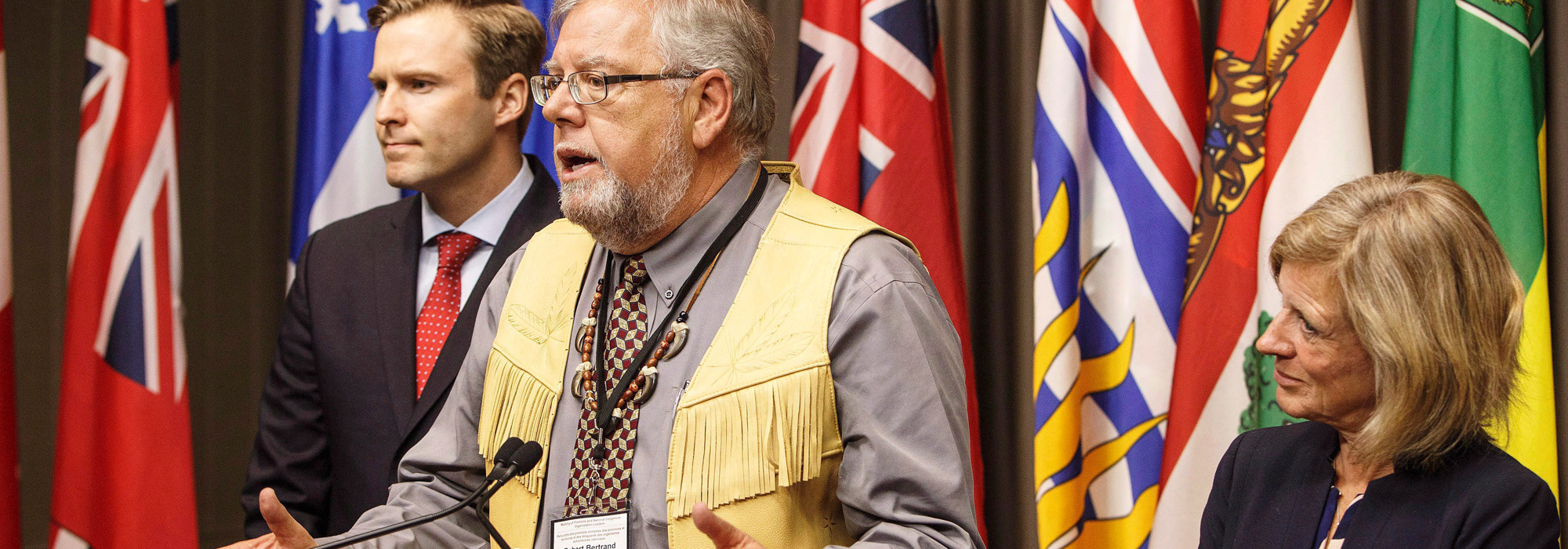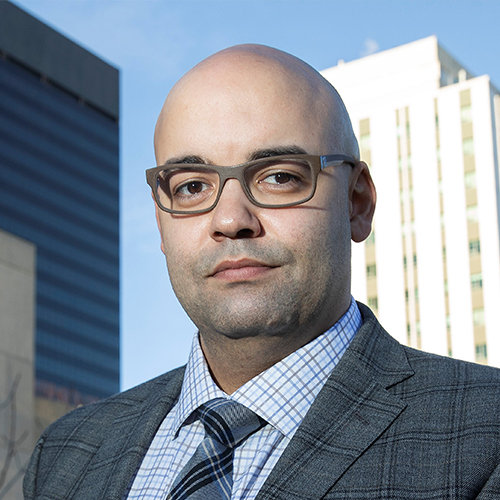
Politics is as much about who is at the table as it is about what is being discussed or decided. This was apparent in July, when three of Canada’s five major national Aboriginal organizations (NAOs) opted to skip their annual meeting with the premiers in Edmonton. The move prompted several media outlets to run lead stories featuring leaders of the Assembly of First Nations (AFN), the Métis National Council (MNC) and the Inuit Tapiriit Kanatami (ITK) condemning the premiers for failing to invite them to the “main table” of the Council of the Federation (COF) — a body exclusively reserved for the 13 provincial and territorial premiers.
The three NAO leaders accused premiers of “segregating” Indigenous peoples from high-level discussions and relegating them to a pre-event conversation; the choice of words less than subtly hinted at racism. More substantively, the three leaders reiterated a key message of the Indigenous rights movement in Canada: “Nothing about us without us.”
Taken to its limits, this maxim would dictate that all political negotiations in Canada — on every file from social policy and human rights to economic policy and development — should involve some form of Indigenous representation. Few would take issue with the notion that Indigenous voices need to be integrated into the development of policy in these areas. Constitutional and moral obligations dictate that they should, as do commitments under the United Nations Declaration on the Rights of Indigenous Peoples and in response to the recommendations of the Truth and Reconciliation Commission; moreover, public policy outcomes are only enhanced by involving people and communities who feel the greatest impact. In this sense, Indigenous people and the organizations that represent them “are not just another special interest group,” as AFN National Chief Perry Bellegarde has stated. Yet not many observers would support the AFN, the MNC and the ITK in taking the argument to the extreme by suggesting that Indigenous people, and NAO leaders in particular, should be present at all high-level meetings on these topics.
For their part, premiers were reserved in their response, extending an open invitation to all NAO leaders to meet with them again next summer. Premiers met with the remaining two NAOs, the Native Women’s Association of Canada and the Congress of Aboriginal Peoples, as usual.
As NAO leaders and premiers contemplate the next steps in their relationship, the question remains: Were the three absent NAO leaders justified in their boycott of this year’s meeting with the premiers? And will it prove to be an effective strategy for securing seats for Indigenous leaders at the COF table? A close analysis of the history of intergovernmental-Indigenous relations suggests the answer is no, on both counts.
First, a bit of history. NAO leaders have been meeting off and on with premiers since 1991, and on an annual basis since 2004 (a year after the establishment of the COF). These gatherings of premiers and Indigenous leaders, with agreed-upon agendas, have occurred the day before the formal COF meeting. From an outsider’s perspective, NAO leaders would find value in meeting with premiers for at least three reasons:
- The Council of the Federation has proven effective at shaping the national agenda, including on issues of importance to Indigenous communities. In their meetings with premiers in advance of COF sessions, NAO leaders can prime the agenda and leverage premiers’ collective voice to place Indigenous issues top of mind for national opinion leaders and decision-makers.
- A lot of the major challenges facing Indigenous communities are tied intimately to areas of provincial or shared jurisdiction, including health, education, justice, the environment and economic development. Given that the agendas of the meetings between NAOs and the premiers are jointly constructed, if there are issues that NAO leaders feel should be discussed (such as trade), they have the opportunity to raise these for discussion.
- The federal government has become increasingly structured and controlling in its interactions with NAOs, limiting their influence over policy agendas and outcomes.
Given the influence of the Council of the Federation, it is at once understandable why the AFN, the MNC and the ITK wanted seats at its table and perplexing why they would choose to skip conversations that, in the past, have proven very productive in advancing mutual interests.
Consider the fact that earlier premeetings at the COF annual gatherings laid the groundwork for major announcements related to the Inquiry on Missing and Murdered Indigenous Women and a groundbreaking report on Aboriginal children in care. Indeed, as Emmet Collins and Megan Semaniuk have noted, Indigenous issues have become increasingly salient features of COF communiqués, particularly since 2012. Premeetings with NAO leaders ensure that provincial-territorial consensus incorporates full input from Indigenous leaders at the national level.
Much work remains in these and other areas, and NAO leaders are right to press premiers to move beyond words when it comes to advancing reconciliation. Yet it is contradictory for some NAO leaders to leave one table because they prefer another, while at the same time calling for more action.
What about the premiers? No doubt, they find value in continuing to meet with NAO leaders, whether from a policy (engagement), moral (reconciliation) or political (optics) perspective. Nonetheless, there are several reasons why premiers could be persuaded to abandon the gatherings in the future, particularly if the boycott continues. First, these annual meetings often come at the expense of relationships with local and regional Indigenous organizations, some of which are at odds with NAO positions and tactics and even challenge whether the NAOs can legitimately claim to represent the interests of their communities. Indeed, premiers often return from meetings with NAO leaders only to task their ministers and officials with communicating the results and smoothing over potential tensions with local Indigenous partners. This is made more challenging by the fact that, unlike other First Nations, Métis and Inuit organizations, the five NAOs have no legal or constitutional standing as representatives of Indigenous peoples; they are invited to the COF meetings at the choice of the premiers, not out of obligation or necessity.
Second, provincial-territorial governments already interact with NAO leaders through other intergovernmental bodies. In 2009, premiers and NAO leaders established a permanent, stand-alone body to work on common issues, tasking their officials to assemble at least twice a year under the aegis of the Aboriginal Affairs Working Group (AAWG). It included provincial-territorial ministers responsible for Indigenous affairs (including several premiers) and the NAO leaders, and it also extended an open invitation to the federal Aboriginal affairs minister (which was accepted twice under the Harper government). In 2016, the federal government formally joined the group, renaming it the Federal-Provincial-Territorial-Indigenous Forum (FPTIF). The AAWG and the FPTIF have fostered important collaboration on issues ranging from housing and education to violence against Indigenous women and girls to economic development. Whereas meetings with premiers tend to result in calls for the federal government to take action, FPTIF gatherings are more likely to lead to actual federal actions.
For these and other reasons, inviting NAO leaders to be full participants in the Council of the Federation is not only unlikely to succeed but ill-advised. Making NAOs members of the COF would involve far more than adding chairs to the table. The COF Founding Agreement would need to be revised, requiring unanimous consent of all premiers to change not only the membership but also the mandate of the organization. Those who study or work in intergovernmental relations know how challenging it can be to achieve consensus on far less consequential matters, which helps to explain why the Founding Agreement has not been amended since its inception.
Nor should it be, in this instance. The Council of the Federation exists to promote collaboration among Canada’s 13 provincial and territorial governments. Its mandate is stretched, its agendas full and its energies strained as it seeks to achieve that objective. It is not simply the addition of more people or more seats to the table that should give us pause (although, as Saskatchewan Premier Brad Wall suggested, adding more bodies does make collective action harder). More crucially, diluting the COF’s mandate could weaken the bonds of intergovernmental relations and prevent important provincial-territorial consensus building on key policy issues, from energy and the environment to justice and trade. Intergovernmental agreement in these areas is key not only to social and economic progress but also to national unity. The Council of the Federation has only recently “come into its own” in this regard, becoming proactive in bringing national policy issues forward and advancing common priorities and initiatives through task forces like the Health Care Innovation Working Group. Expanding its mandate to assuage both provincial-territorial and Indigenous-Crown tensions would not be productive, at least at this stage.
National Aboriginal organizations know all of this, which is what makes the boycott by the AFN, the MNC and the ITK all the more disappointing from a policy perspective — and confusing from a strategic one. If the boycott continues, let us hope that substantive collaboration among provincial-territorial governments and Indigenous organizations continues at other tables.
Photo: From left, New Brunswick Premier Brian Gallant, Robert Bertrand, National Chief, Congress of Aboriginal Peoples and Alberta Premier Rachel Notley address media following the meeting of the Council of Federation, in Edmonton on Monday, July 17, 2017. THE CANADIAN PRESS/Jason Franson
Do you have something to say about the article you just read? Be part of the Policy Options discussion, and send in your own submission. Here is a link on how to do it. | Souhaitez-vous réagir à cet article ? Joignez-vous aux débats d’Options politiques et soumettez-nous votre texte en suivant ces directives.








